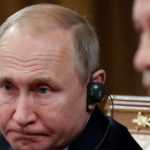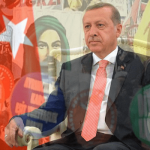A proxy war has been raging in Libya since 2011 when NATO air strikes helped rebels overthrow of despot Muammar Gaddafi.
The two biggest remaining factions are the Government of National Accord, based in Tripoli and supported by Turkey and Qatar and the Libyan National Army, led by Khalifa Haftar who is based in the eastern city of eastern and backed the United Arab Emirates, Egypt and Saudi Arabia
Haftar’s forces made rapid advances across the country and are now battling troops loyal to the Government of National Accord on the southern outskirts of the capital near around the former international airport.
On this week’s Gidişat podcast, Ahval Turkish editor-in-chief Ergün Babahan discussed Turkey’s place in the conflict in Libya with Fehim Taştekin, a Turkish columnist and the author of books on the Islamic State, Syria and Syrian Kurdish political groups.
What role are foreign powers playing in Libya right now?
“As for the West, France and Italy are battling it out to see who will gain control of the country’s oil resources, with Italy backing the government in Tripoli and France on Haftar’s side, alongside Russia. Washington is watching nervously to see whether Moscow makes gains in the country, but has so far refrained from entering the fray with any real force.
“NATO came to Libya as a strike force, and it achieved its goal of overthrowing the old regime. Then came the 2012 raid by Islamists on the U.S. embassy in Benghazi, in which ambassador Christopher Stevens was killed.
“The attack became a problem that has dogged then Secretary of State Hillary Clinton ever since, but also marked the point after which the United States minimised its role in Libya. It is only discomfort at the Russians’ investment in Haftar that has brought Washington back to the table.
“In other words, there are many actors involved in the country. Yet at the basic level, this is a clash between two axes. On the one hand, the Tripoli-based structure composed of Muslim Brotherhood, and other Islamist groups and supported by Qatar and Turkey.
“On the other, the axis supported by the United Arab Emirates, Saudi Arabia and Egypt, countries which have come to blows with Turkey and Qatar in numerous arenas around the Middle East and North Africa. This axis has coalesced around the force that is battling the radical Islamist organisations: Haftar.”
How has the domestic balance changed in Libya?
“The struggle for control of Libya’s sizable oil wells is continuing at full pace, with Haftar’s forces currently holding the advantage. They tipped the balance by coming to agreements with local forces and tribes in the southern region of Fezzan, gaining control of its rich oil reserves.
“The United Nations has been coordinating peace talks, but these have been plagued by delays, and a number of decisions that arose from them have failed to take effect. It was as these peace talks continued in Libya last week that Haftar made his latest advances, an attempt to seize the stronger negotiating position by capturing more territory and piling pressure on Tripoli.
“This is clearly a game played on multiple levels. The forces supporting Haftar have rejected the idea of a military solution to the conflict in Libya, but I believe the retired general was only able to make his latest advance with their go-ahead.
What about Turkey’s role in the conflict?
“Turkey’s role in the conflict has brought it frequent accusations from the Tobruk government and Haftar, who say it has been arming radical Islamist groups. Throughout the conflict, contraband weapons have been discovered on numerous ships heading to Libya from Turkey. Turkey has also been accused of shipping weapons to Libya through Sudan.
“In certain situations, the UN embargo on arms shipments to Libya has worked in Haftar’s favour. Not only Turkey, but Haftar’s Russian and Egyptian allies have smuggled arms to the country, yet it is Turkey that most frequently takes the blame. As a result, Ankara has been to an extent excluded from the peace process, as was seen last November during peace talks in Palermo, Italy. Turkey’s hand was weakened when it was forced to withdraw from the conference after its delegates were left out of an important meeting.
“The head of the government in Tripoli is in close contact with Turkey, and his side still trusts in the support of Turkey and Qatar. The Tripoli government has a very poor record, but it is still the one recognised by the United Nations, though in this respect the situation is far from clear.
“For a start, Turkey is backing a government that refused to recognise elections that went against it. This was in 2014, the first elections since the fall of Gaddafi, and one in which voters dealt serious blows to the Islamists in parliament. However, those Islamists refused to countenance a loss in the polls. An echo, in a sense, of the syndrome Turkey has experienced since the ruling party’s major losses in the March 31 local elections.“The groups deprived of their victories in the 2014 elections moved to Tobruk to establish the rival House of Representatives. This brought Libya to its current state, divided between two parliaments, two governments and two centres of power. Turkey chose to support the Muslim Brotherhood politicians in the Tripoli-based authority of the time, the General National Congress. In doing so, it clearly took sides in the conflict, and lost its credibility as a mediator.”
What role do Islamist groups play in the conflict?
“Islamist organisations have made large gains in Libya, including the extremist jihadist Islamic State. Militias from Chad, which lies to the south of Libya, have also crossed the border and sown chaos in large territories in the south of the country.
“Haftar has used diplomacy where possible with these groups, and failing that has employed force against them. This has changed the balance, and left Tripoli in a weakened position. At the moment the sole major support for the Tripoli government comes from its recognition by the UN. In the field, Tripoli has the upper hand in areas where Islamist local militias are strong.
“Haftar, however, can also count on military support, including air support, from Egypt, Jordan and the United Arab Emirates. These states may deny it, but the reality is military support has been provided, likely to strengthen Haftar’s hand before the conference.”
Will Turkey’s support for certain groups in the conflict have repercussions?
“There is not much Turkey is able to do under current circumstances. It continues to back Tripoli, but lacks the power to shift the balance in its favour. Tripoli’s Prime Minister Fayez al-Sarraj continues to make frequent trips to Turkey, and Turkish Defence Minister Hulusi Akar and Chief of the General Staff Yaşar Güler made a recent trip to Tripoli. Yet these meetings have had little international impact. Far more significant have been the frequent discoveries of ships bearing contraband arms to Libya from Turkey. This has given the game away in the worst possible manner.
“The Arab states supporting Haftar count the Muslim Brotherhood as a major enemy on a regional level, and they see Turkey as its supporter. The Turkish government has become deeply involved with the brotherhood, and many of its members who have fled their own countries have opened up offices in Istanbul. This has been a careless approach, and Turkey’s diplomacy is paying the price, as the country becomes known as a financier of radical groups.
“Libya is one example of this. Some of the Islamist groups Ankara has worked with in the country are linked to al Qaeda. Yet Ankara has embraced these groups, and has consequently gained control over the Islamists.
“This is not a matter of perception: the relations are there for all to see. Turkey’s foreign policy has embraced religious groups and jihadists, and this policy has been disastrous. The country is now one accused of financing radical Islamists, and this is a frequent topic of discussion in the news and on television.
“The West sees this too, and it is not only a matter of oil. In the end Turkey’s stance impacts on a number of areas that impact on Europe, including human trafficking, drug trafficking and migration.”
By Ergun Babahan
Source: Ahval News



